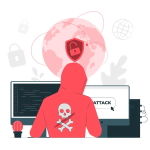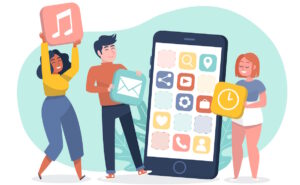AT&T, the large phone operator, has issued a critical warning to users of Gmail and Outlook. AT&T warns users to be careful because attackers are sending phishing emails to steal money from their bank accounts.
One of the useful and safe payment methods is the use of digital financial transactions. They give you a way to keep a close eye on your financial accounts. Additionally, millions of people throughout the world prefer to make digital transactions due to its convenience, ease of accessibility, and speed.
Globally, there is widespread use of digital banking and financial technologies. Because it is so widely used, it easily becomes a top target for many online scammers and different phishing attacks.
AT&T warned that scammers are sending messages with suspicious attachments and files that might harm your devices with malware or install harmful software. Additionally, people regularly get mail that at first look looks real, only to be tricked into providing their personal information.
Phishing Attacks
As fraudsters get more skilled at creating convincing copies of trustworthy companies, it is getting harder to differentiate these phishing emails from one another. The dark side of ChatGPT also becomes clear whilst attackers may use it to create complex content for their phishing emails, boosting the illusion of trust.
These fake mails could contain odd claims about your invoice, including indicating that you need to confirm a payment or verify an account. Criminals often demand personal or account information while making up stories about large balances that need to be paid.
Phishing schemes are deliberately created to make the target feel threatened and time constrained. When a person receives an email like this, they become anxious because they fear they will quickly give in to pressure and click on the misleading link.
“There is a chance that malware will be downloaded automatically to the target’s device after they click the link. Malware can give attackers full access to the target’s private data and devices.
AT&T issued recommendations to help people protect themselves from phishing attacks. Prioritising your online security is important. Use strong passwords for both your computer and email, and regularly update your device with the most recent security updates. Additionally, be careful and avoid clicking on any links or downloading any anything from any strange emails or text messages. Report the issue to your bank or credit card provider right away if you unluckily become the victim of a scam. In cases of cyberattacks, incidents can be reported to the National Cyber Security Centre (NCSC). When such attacks are reported to the centre, immediate action is taken to tackle the risks, preventing others from falling victim to similar scams.
Phishing attacks are on the rise, and it is important to protect your organisation. One effective way to do this is by increasing user awareness about these types of attacks. Phishing Tackle is a great resource that can help you in this regard. They offer a free 14-day trial to help train your users to recognise and avoid phishing attacks.
Although technology can be helpful, it cannot spot 100% of phishing emails. Therefore, user education is crucial to minimising the impact of any successful attacks. Consulting with Phishing Tackle can provide valuable insights and tools to help you strengthen your defences against phishing attacks.








